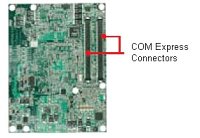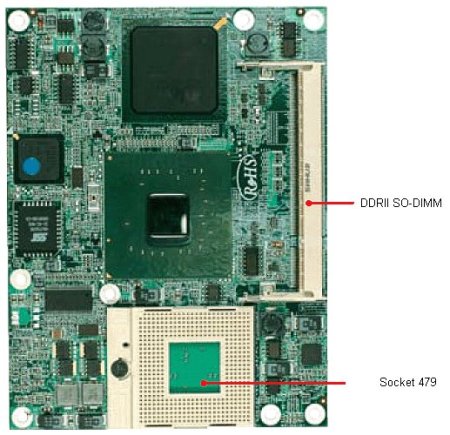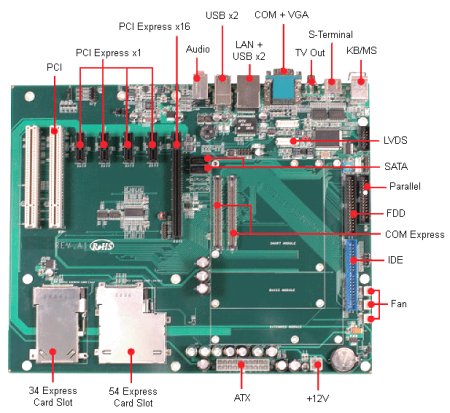COM Express module runs Linux
Oct 17, 2008 — by LinuxDevices Staff — from the LinuxDevices Archive — views Win Enterprises announced a COM Express module targeting medical, test and measurement, kiosks, and network security applications. The MB-73150 (left) supports Core 2 Duo, Pentium M, or Celeron M processors, has gigabit Ethernet, accepts up to 2GB of RAM, and runs Linux, Win says.
Win Enterprises announced a COM Express module targeting medical, test and measurement, kiosks, and network security applications. The MB-73150 (left) supports Core 2 Duo, Pentium M, or Celeron M processors, has gigabit Ethernet, accepts up to 2GB of RAM, and runs Linux, Win says.
 Like other Type 2 COM Express modules, the MB-73150 has two surface-mount 220-pin connectors (right), through which it passes all of its signals to a development board or custom carrier board. On its flip side (below), the device has a processor socket variously described in Win Enterprises' literature as being either a Socket 478 or Socket 479, but labeled as the latter in their picture.
Like other Type 2 COM Express modules, the MB-73150 has two surface-mount 220-pin connectors (right), through which it passes all of its signals to a development board or custom carrier board. On its flip side (below), the device has a processor socket variously described in Win Enterprises' literature as being either a Socket 478 or Socket 479, but labeled as the latter in their picture.
Adding to this confusion, we're wondering if the socket might more rightly be described as Intel's Socket M design. The mystery arises because the chipmaker has fielded a variety of sockets that are visually almost identical, but are not actually pin-compatible.

The Win Enterprises MB-73150 COM Express module
(Click to enlarge)
Be this as it may, Win Enterprises does definitively state that the new MB-73150 is compatible with Intel Core 2 Duo, Pentium M, and Celeron M processors that use 533MHz or 667MHz frontside buses. The module is said to include Intel's 945GME northbridge and ICH7M southbridge, with support for up to 2GB of DDR2 memory.
The MB-73150 supports dual independent displays, with CRT resolutions up to 2048 x 1536 pixels, and LCD resolutions up to 1600 x 1200, according to Win. The device's wealth of interfaces include gigabit Ethernet, eight USB ports, and two SATA ports, according to the company.
The device also has eight GPIOs, plus an LPC and I2C bus. Expansion interfaces include five PCI Express x1 lanes and one PCI Express x16, or one PCI Express x4, one PCI Express x1, and one PCI Express x16. In addition, 32-bit 33MHz PCI is also supported, Win says.

The Win Enterprises MB-73140 baseboard
(Click to enlarge)
Of course, none of these interfaces can communicate to the outside world without a little assistance. Win's answer to that problem is the separately available MB-73140, pictured above. This ATX-format baseboard, measuring 12 x 9.5 inches (305 x 244mm), has multiple expansion slots, dual Express Card slots, VGA and TV output, plus support for SATA and IDE disk drives.
Features and specifications listed by Win Enterprises for the MB-73150 module on its own include:
- Processor — Intel Core 2 Duo, Pentium M, or Celeron M CPUs with 533MHz or 667MHz frontside bus
- Memory — Up to 2GB of DDR2 RAM via single SODIMM socket
- Networking — Gigabit Ethernet
- Other I/O:
- 8 x USB 2.0
- AC'97 audio
- 2 x SATA 150
- 1 x LPC
- 1 x I2C
- 8 x GPIO
- Dual 18-bit LVDS channels, analog VGA, and TV out
- 8 x USB 2.0
- Expansion:
- 5 x PCI Express x1 and 1 x PCI Express x16, or 1 x PCI Express x4, 1 x PCI Express x1, and 1 x PCI Express x16
- PCI 2.3 (32-bit, 33MHz)
- 5 x PCI Express x1 and 1 x PCI Express x16, or 1 x PCI Express x4, 1 x PCI Express x1, and 1 x PCI Express x16
- Power supply — 12VDC
- Operating temperature — 0 to 60 deg. C (32 to 140 deg. F)
- Dimensions — 5 x 3.8 inches (125 x 95mm)
The MB-73150 module and MB-73140 baseboard are both said to be RoHS-compliant. The devices support Linux, Windows XP Embedded, and FreeBSD, says Win.
According to Win Enterprises, the MB-73150 is sampling now, and can be available in quantity within four to six weeks. It costs $256 without a CPU, the company says.
Further information on the MB-73150 module and MB-73140 baseboard may be available on the company's website, here and here, respectively.
This article was originally published on LinuxDevices.com and has been donated to the open source community by QuinStreet Inc. Please visit LinuxToday.com for up-to-date news and articles about Linux and open source.